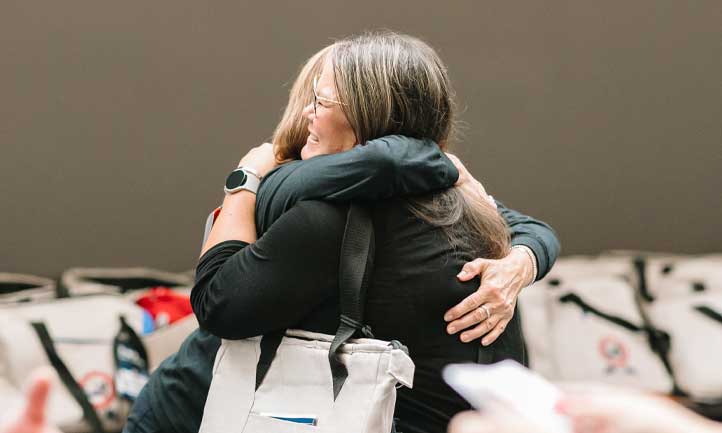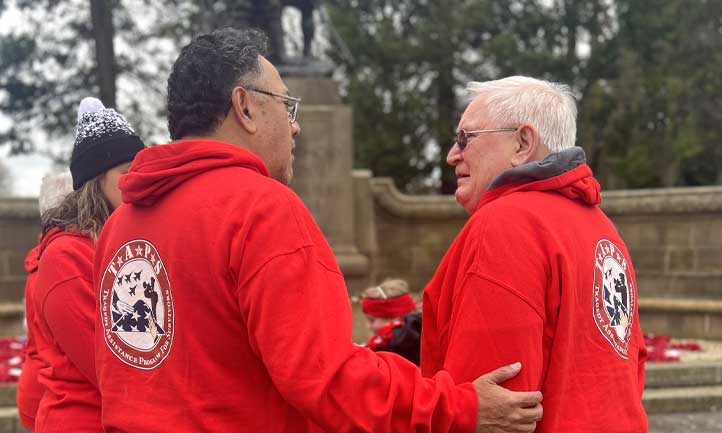From Peer to Peer
Author: Heather Gray Blalock
A TAPS Peer Mentor's Guidance for Supporting Others in Grief
As a surviving spouse, I thought I understood grief. I felt I would be prepared to handle a grieving widow or family member who lost a loved one. So, it took me by surprise when I wasn’t. Five years after my husband was killed in Afghanistan, a pilot friend of ours was killed in a training exercise. I was at his wife’s house moments after the notification team left, and I felt completely bewildered. My heart broke for her and their children. I found myself wandering in circles wondering how to help propel them through the difficult days and seemingly impossible tasks that loomed. My only true experience with fresh grief had been on the inside looking out. I had no clue how to be on the outside looking in. Her grief became my grief all over again, and all I could do was mourn as she mourned.

I eventually realized if I wanted to truly be of help to others through their grief process, I was going to need to better understand grief itself, with something beyond experiential knowledge. I went back to college and earned a master’s degree, focusing my studies on counseling and theology. When I felt ready for true “field experience," nearly a decade after my husband died, I decided to become a TAPS Peer Mentor and received specific training on how to “companion” another facing the loss of their own beloved service member. Yet even with all that preparation, the first time I reached out to my mentee in the wake of her loss, the weight of grief was a heavy burden to bear. I initially feared I might flounder, but what an incredible blessing it is to bear one another’s heaviest burdens together. To companion another in their grief is an honor, and I hope to encourage and equip others to do just that.
Often, people reach out to survivors for advice on how to come alongside someone who has suffered loss — thinking because we have experienced grief for ourselves, we are subject matter experts. Survivors have been the recipients of support, but that does not necessarily equip us to automatically know how to best extend support to others. Every grief is different. There is no training manual for grief or how to love and serve well those who find themselves in its wake. While not an exhaustive list or exact proven equation, I’ve learned a few things that may help anyone coming alongside the grieving.
First and foremost, recognize that regardless of how long ago your loss occurred, caring for the bereaved may trigger a personal grief response. Think of your grief as a pack of puppies corralled in a fenced yard. Even if only intending to open the gate for one, all the others may come charging out. Similarly, emotions reside together; tapping into one can stir up others.
The time immediately after loss is survival mode. If possible, just make sure the bereaved are surrounded by people who will ensure basic needs are being met — that they’re eating, bathing, and getting where they need to be. They will likely need you most when the dust settles — so to speak, and life is forced to take on a “new normal.” That’s when the silence becomes deafening and support is critical. Many times, those hoping to console the grieving fear they may inadvertently make the situation worse or add to their pain. Let me assure you, their pain is so raw that barring you saying that their loved one died in vain, there really is not much you could do to add to it. Trust that your presence, prayers, and supportive actions are meaningful and appreciated.

At the same time, know there really isn’t anything you can say or do to truly assuage grief. The goal is not to make them “feel better” or “get back to normal,” but to be available to them as they mourn. The one thing the bereaved want and need (their lost loved one) cannot be provided. So, just remember that your intention of support is still impactful even if it feels futile.
Death and grief are intimidating, but do not be afraid to offer whatever support you can. That support may be physical, emotional, or spiritual. One type of support does not outweigh the others in importance. Maybe the most you can do is promise to pray for them — then faithfully do that. If you are in close proximity to the bereaved, your support may look like emotional companionship or completion of tasks for them. I recommend not asking the bereaved the common question, “What can I do for you?” Most often they don’t know what they need and the process of trying to figure it out may be overwhelming. Instead, offer suggestions like:
- “I’d like to come over; is that OK with you?”
- “May I take you out for coffee and a change of scenery?”
- “I’m heading to the grocery store, what can I pick up for you?”
- “I’d like to [bring dinner or drop off some gift cards to your favorite restaurants, pack the kids’ suitcases for the unexpected travel, be available or present when you go through his personal effects], would that be helpful?”
Choose one specific thing you feel may be beneficial and give them the choice to accept or not. Providing specificity when everything in their head may seem foggy can be quite effective. Do not be offended if your specific offer is refused. Take their response in stride and try again later.
I personally believe the best thing survivors can do with their grief is use it to help others when the time is right. Don’t be afraid to just do what you can when you can. Know that bearing one another’s burdens can be hard but appreciated, even if the bereaved may not have the bandwidth to respond to it. Don’t give up on your community. Reach out when you need help, and help others do the same. We are all in this together.

TAPS Peer Mentors
Peer support, just like the “companioning” Heather describes in her article, is at the heart of the TAPS mission. Whether you would like to be paired with a Peer Mentor; are now 18 months beyond your own loss; or you are a trained Peer Mentor ready to deepen your involvement with the program, our Peer Mentors page can help you take the next healing step.
Heather Gray Blalock is the surviving spouse of U.S. Air Force Maj Walter David Gray and a TAPS Peer Mentor.
Photos: TAPS Archives
